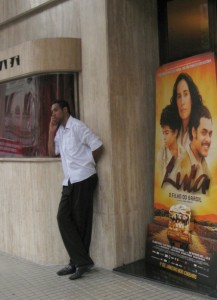
Photo © Michael Sommers.
They say that art imitates life. It thus stands to reason that as Lula, head of the Brazilian government, enters the final year of his presidency with approval ratings of over 70 percent, a feature film about Lula’s life should be breaking box office records. However, in Brazil, reality often has little to do with reason.After a much-hyped debut screening in Brasília from which the notoriously sentimental president emerged sobbing, Lula, O Filho do Brazil (Lula, the Son of Brazil) hit theaters across the country on January 1. Assuming an elegiac tone, the film narrates the rags-to-riches story of Luiz Inácio da Silva, the youngest of eight children born in the rural interior of the poor Northeastern state of Pernambuco. After being deserted by their abusive drunk of a father, “Lula” and his siblings are raised single-handedly by their brave and self-sacrificing mother who later takes them off to São Paulo in search of a better life.
To help make ends meet, young Lula shines shoes and sells candy in the streets. Though he dropped out after Grade 5, he later attends technical school at night while working grueling factory jobs during the day – one of the film’s most anticipated scenes is when he loses part of his little finger while working overtime at a sheet metal plant. Tough times continue as Lula enters his early 20s and witnesses his first wife’s tragic death during childbirth because of the couple’s inability to afford medical care.
On paper, Lula’s life story has all the elements of a great, inspiring epic film not to mention a thoroughly engrossing melodrama and director Fábio Barreto milks the hagiographic and tear-jerking elements for all they’re worth.These experiences feed Lula’s growing political activism. He rose to become president of the steelworkers’ union and was one of the founders of the Partido dos Trabalhadores (Worker’s Party), which became a major political opposition force to the military regime. The film ends with the beginning of Lula’s political career: after running three times for president, he finally triumphed in 2002, becoming the most popular, and one of the most admired Brazilian presidents both at home and on the international stage.On paper, Lula’s life story has all the elements of a great, inspiring epic film not to mention a thoroughly engrossing melodrama and director Fábio Barreto milks the hagiographic and tear-jerking elements for all they’re worth. As a result, critics almost unanimously panned the much-anticipated film, which – with a budget of R$12 million (roughly US$7 million) – is the most expensive Brazilian film ever made. The bigger surprise was the public’s failure to turn out in the expected droves. The movie opened in fifth place and in subsequent weeks has gradually sunk to the bottom of the box office.
Perhaps the strongest reaction the film provoked was from the government opposition; in Congress, a deputy demanded that the government come clean re: alleged contracts with the films corporate sponsors. Others accused the film of having a propagandistic agenda; 2010 is an election year and Lula’s chosen successor, Dilma Roussef, while a competent administrator, lacks the populist charisma that so endears the president to the masses.
Opinions vary as to why Lula the film is such a bomb, while Lula the president is still riding so high in the polls. The consensus seems to be that Lula’s life story has entered the zone of mythdom to such an extent that it is already common knowledge to all Brazilians. Moreover, why pay to see Lula in 2-D when you can see the real flesh-and-blood version standing up to First World leaders at global events, shaking hands with farmers of the Movimento dos Trabalhadores Sem Terra (Landless Rural Workers’ Movement), or playing a game of pick-up soccer on the lawn of the official presidential residence?